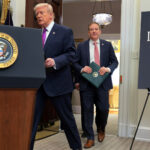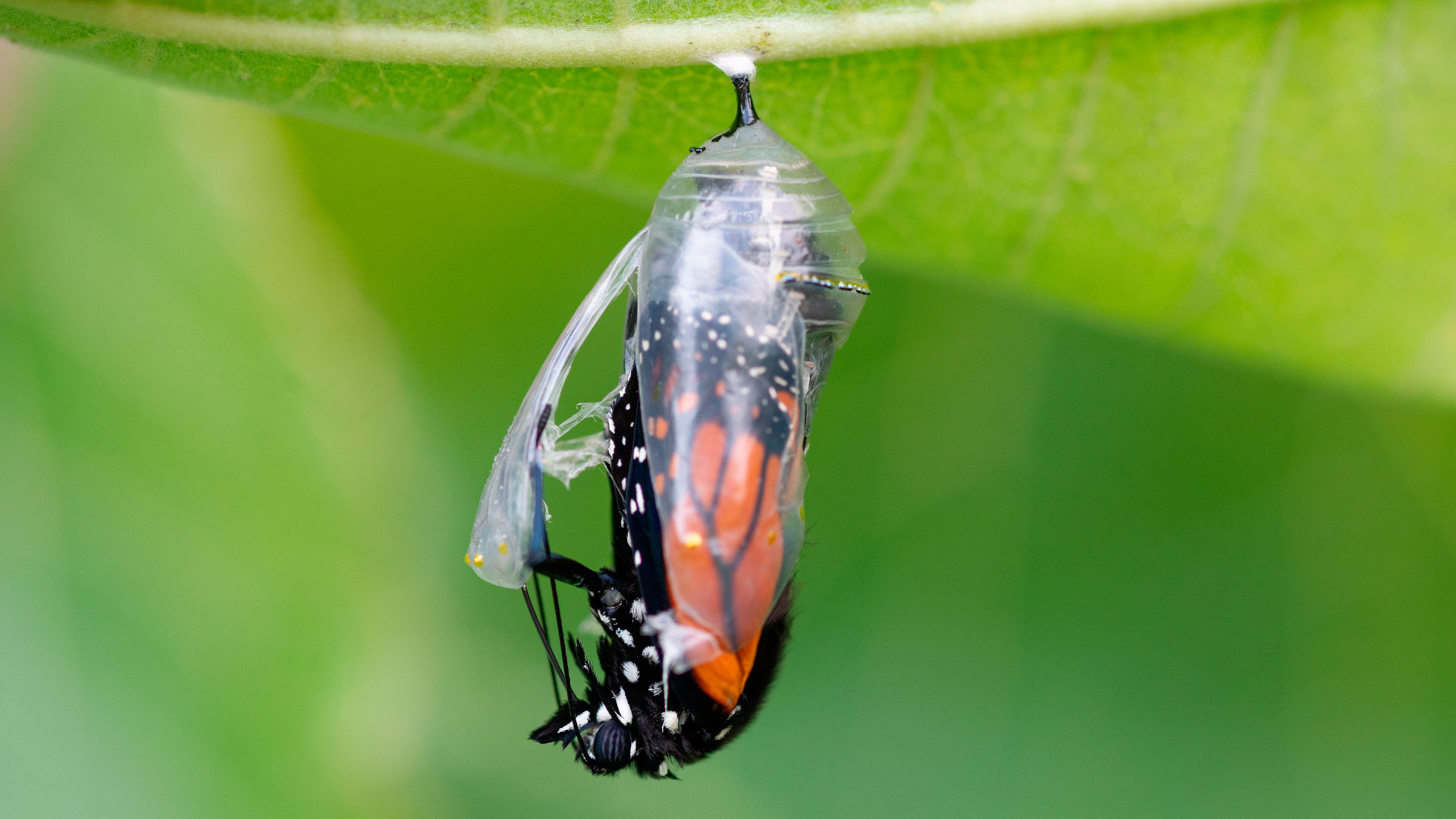American science stands on the precipice. On one side is the administration of Donald Trump and MAGA political leaders threatening to push us over the cliff; on the other is the quick plunge to oblivion.
This is no exaggeration. While ostensibly the administration’s actions are couched in the dual language of budgetary concerns and the elimination of DEI initiatives, the reality is much more broad, and much more bleak. Science across the nation is getting strangled, with funding streams to universities being summarily cut off, staff members of national agencies dismissed, and budgets getting axed.
But the administration isn’t acting in a vacuum; Trump is not moving without impetus. For at least two decades, there has been a growing distrust of science within conservative circles, a distrust supercharged by the Covid-19 pandemic and its fallout. The “Make America Great Again” circles — both its political leaders and their supporters in the public — don’t just endorse the reshaping of a system that has been in place since World War II. They are cheering on its destruction.
As scientists, my colleagues and I were taught to look hard at the evidence, no matter how uncomfortable or even distressing. I watched in dismay as public trust in science plummeted during the pandemic, and as anti-vaccine sentiments became a calling card for the hard right. I spent months grappling with this painful information. I had assumed that the general public would always love science. This turned out to be a very dangerous assumption indeed.
During the summer of 2020, I drafted a book that wouldn’t be released for another four years, mainly due to academic resistance to the topic. In the book, I predicted that the relationship between science and the public was at a tipping point, and that if we didn’t institute reforms, our beloved institution would be decimated.
For at least two decades, there has been a growing distrust of science within conservative circles, a distrust supercharged by the Covid-19 pandemic and its fallout.
I wish I hadn’t been so right. But now, at least, the evidence of the breakdown is unignorable: The confidence that conservatives have in science has hit its lowest point since the General Social Survey started tracking such opinions in 1973. They don’t want our research. They don’t want our expertise. They don’t want many of our results.
Science can no longer depend on the broad, bipartisan, neutral support it has enjoyed for over half a century. And so as a community, when faced with this evidence, we scientists are motivated to search for a root cause, of which there are several. One of the potential causes is the coalescence of bad faith actors, especially post-Covid. Activists and social media personalities feed into disinformation campaigns, disingenuously warping honest scientific results to fit preconceived narratives and highlighting shoddy, even fraudulent, work to advance their own goals, which also happen to include the destruction of science as a source of credibility and expertise.
Here’s another possible cause: MAGA has a point.
The MAGA distrust in science is multilayered and has deep roots, but I believe it boils down to three intertwined strands.
Conservative academics have long felt ostracized by universities, whose faculty and administration, despite noble arguments of impartiality, act to diminish and disregard traditionally conservative lines of thought. This creates grudges and an intellectual foundation for further anti-science rhetoric.
MAGA-aligned politicians, like Sen. Ted Cruz, also argue that we are wasting money on useless research, whether it’s an over-expensive telescope or “woke” social science experiments. Even if these aren’t costly endeavors compared with the total federal budget, when you’re struggling to put food on the table — as many Americans are — government waste becomes any easy target for your frustrations. This creates a convenient hook into the public dialogue and serves up a simple narrative for taking down science.
Lastly, right-leaning Americans, whether they are already sympathetic to MAGA policies or not, have a more negative perception of scientists, according to a 2024 Pew survey. To me, this shows that many feel they are being lectured to by public health officials and scientists in public-facing leadership positions and are tired of it. They are sick of what they consider to be moralizing, demonizing, and recommendations and instructions that ignore moral or religious authority. I’ll be honest, I found it annoying to wear a mask every time I stepped out into public; I can imagine it being doubly so when you’re constantly made to feel ashamed by public health authorities for choosing not to.
Some scientists have unintentionally rubbed many Americans the wrong way, creating plenty of clear space for bad faith actors — hard-right media personalities and politicians — to make successful headway, building the opportunity for those same actors to have the political backing they need to tear down one of our most treasured national institutions.
Here’s another possible cause: MAGA has a point.
As scientists, we are also trained with how to deal with evidence, which is to create a hypothesis and test it. So in the face of these bare facts, here is my hypothesis: What if we listened to those sympathetic to MAGA?
The only way science can succeed for generations is to win over the hearts and minds of the entire electorate, not just liberals. The decades-old arguments about science as the engine of prosperity and innovation don’t seem to be resonating with broad swaths of the public anymore. If we want bipartisan support, we need to become bipartisan.
So let’s change.
The first step is humility. We need to look MAGA supporters in the eye and admit openly that we’ve made some mistakes. We need to tell our MAGA friends, relatives, and politicians that we hear them and offer concrete solutions. This is the basis of the philosophy of radical empathy: the kind of empathy given with no expectation of receiving it in return.
A scary place, for sure. What if they use this as an excuse to destroy science? Well, they’re already destroying science — not much to lose on that front. Plus, MAGA is literally in charge right now, and we should plan for them to continue to be in charge, or at least a powerful political voice, for quite some time.
First, the universities, the academic bedrock of modern science, need to heed their own values and enact policies that prevent departments from psychology to physics and everything in between from becoming echo chambers. These policies can include inviting more conservative (and specifically MAGA) speakers and recruiting diverse political viewpoints among faculty. We are supposed to embrace and confront dissenting views, not reject them.
Perhaps with different political views heard and respected within the halls of academia, intellectual conservative voices can provide the heft needed to make pitches for “useless” science projects resonate across the aisle and with a broader slice of the American public. How does a new project fit into a conservative, or even religious, worldview? How can valid moral or ethical — or even budgetary — concerns receive the proper venue for consideration in the decision-making process? These questions can only honestly be answered by someone with deep personal political conservative conviction.
And lastly, maybe academics need to do less talking and more listening, especially when it comes to the fraught arena of public policy. There is no doubt that science offers valuable input when it comes to policymaking, but it is far from the only voice at the table. We are most respected when we do what we do best: study and learn. We can offer advice, perspectives, and analysis. When we make the jump to offering recommendations and advocating for particular policy outcomes, whether it’s about climate change mitigation or mask mandates, we get lumped in with the authority figures pushing those views.
I’ve had absolutely zero policy training as a student of science; I doubt most of my colleagues have either. If we’re going to wade into political waters, we better learn how to swim with the sharks first.
I trust that most Americans want what I want: a stable home and a prosperous future for our children. Sadly, many of those same Americans do not see science as a path to achieving either of those visions. But if we are to take our vocations seriously and respect the rule of evidence as the guiding force in our decisions, then we must take the lesson we have learned from evolution: We must either adapt or die.
Paul Sutter is a cosmologist at Johns Hopkins University and author of “Rescuing Science: Restoring Trust in an Age of Doubt.”













MAGA and many of the two-thirds of Americans without a college degree reject the intellectual elite because they feel disrespected by that elite. Even though the financial elite are diverting money away from the MAGA people, it is the intellectual elite that they resent more.
Every human has a limited amount of mental energy. Homo sapiens left other human species behind when they were willing to trust one another enough to engage in the division and specialization of labor. To focus on being a heart surgeon, you have to be willing to let someone else handle auto repair and dentistry. But such a separation of roles requires the ability to trust one another.
We must show just as much respect to the guy who cleans our schools or picks up our trash as we do to the heart surgeon. Democracy requires the elimination of the caste system. In authoritarian countries your rank in society is rigid and well-defined. In such countries, who you know is more important than what you know.
If you are willing to use some of your limited mental energy in understanding and appreciating science, then you glad to be told the probability that it will rain tomorrow. But if you prefer to use all of your mental energy to focus on sports, entertainment and social media, then you just want to know if it will rain tomorrow. When told the probability that it will rain, the anti-science MAGA guy will say: “If you don’t know if it will rain, just say so. Don’t give me this probability nonsense.”
You are right on target with the importance of listening to the MAGA folks. On one hand, the underlying problem is the distorted money flow that started around 1976 when workers were no longer paid the value of their marginal products. Hard work continued to pay off, but not for the worker doing that hard work. The worker’s hard work paid off for the shareholder, under the maximization of shareholder value. But more important than money was the importance of respect. Workers no longer felt respected, especially after the suppression of unions with the passage of “right-to-work” laws in many states that we thinly disguised ways of using the “free rider” problem in economics to undermine unions. The fundamental economics idea that workers compete with one another for jobs and that jobs compete with one another for workers is an inaccurate description of the reality that companies generally control blocks of jobs that do not compete with one another. An extreme example is coal mining but almost every business sets the salaries for blocks of positions that do not compete with one another for workers. The result is that wages are set well below what would otherwise be an efficient equilibrium wage. Unions were able to bring wages back closer to the efficient equilibrium wage. CEOs are way overpaid. People can no longer buy back the value of the goods and services they are producing and many have gone deep into debt. Politicians use public debt to keep us out of recessions.
We are at a place where the majority of American adults don’t believe in hard sciences, period, not just the utility of them. It’s too difficult for them to understand, especially so when it’s so easy to chase a conspiracy rabbit hole and validate whatever feeling led you down that hole. You are never going to educate these adults, only try to limit the impact they have on children, which looks increasingly bleak. I spoke to someone yesterday who believes autistic kids are telepathic more than he believes the theory of evolution.
I used to think similar to you. If only we just listened to the MAGA conservatives, I thought this way for many years – then they would finally respect us and show we respect them. And perhaps this is true for my family members and friends, who have kind souls, are willing to listen, and may feel pissed off by their interactions with the pandemic. But over the past months I have come to accept a sad truth, those in power have no interest in listening, no interest in respect, and simply view scientists as an obstacle that gets in the way of their own prosperity. I experienced this first hand when trying to contact my own representatives. I don’t see how any amount of “listening” followed by “reasoning” is going to stop that. I still believe the average American (such as myself) are good and we can turn this around. But the idea that those in leadership positions right now will change their mind after “listening” to them I believe is entirely incorrect. The only way out of this is in the short term is through the courts — followed by a longer term goal by what you described in my opinion.
The fundamental error in this piece is its implicit premise that there is a “mandate” for the MAGA movement in general, and for the MAGA destruction of science in particular.
President Trump won the 2024 election with about 50% of the popular vote, while Kamala Harris and other candidates won about the same percentage. (And nearly 35% of eligible voters stayed home.
Meanwhile, polling has shown that only 15% to 36% of the adult population can be characterized as true MAGA voters.
Congress is generally aligned with voting patterns. In the House there are 220 Republican seats to the Democrats’ 212–hardly a massive majority–and Republicans hold only 53 of the Senate’s 100 seats.
But more fundamentally, we do not have a strong sense of the depth of Congressional support for the President’s anti-science agenda (and by extension, voters’ support), because he has made most of his science and health policy through Executive Orders and administrative appointments rather than by working with Congress.
In short, the President’s success thus far in destroying science says more about the peculiarities and flaws of our political system than about the popular will, and it rests on very shaky ground.
Dr. Sutter argues that scientists should embrace their tradition of dispassionately embracing evidence by accepting that MAGA is “in charge” and is likely to enjoy sustained support for its anti-science agenda for the foreseeable future. The evidence, however, says otherwise.
The reason people no longer trust science as they used to is because in the 21st century the quality of work by professional employed scientists has dramatically decreased, along with the rate of technological innovation. The large majority of peer-reviewed scientific journal articles are not replicable for various reasons from fraud, incompetence or not understanding how to use statistics.
This decline is caused by ever increasing funding of science by the US government. Nearly all of the funding for science in the US and around the world comes from the US Treasury, either directly or indirectly. With this funding comes rules to justify the funding, particularly the publication of a positive result in a peer-reviewed journal.
Anyone familiar with science knows the majority of scientific experiments are inconclusive, of the rest most are negative. The need for positive results has corrupted scientific work by paid professionals and the peer-review of their work by other paid professionals.
The cure for both the decline in the quality and the loss of trust in science is the same; radically reduce funding of science by the US government to about the level it was in the 1970s. This will starve bad science being performed by professionally employed (or formerly employed) scientists who along the way unlearnt science.
This the process you are seeing now, or at least the beginning of the process. Your article laments this, when in reality you should celebrate it.
When government money goes to the National Institutes of Health (NIH) and the National Science Foundation (NSF), it is mostly awarded to professors at research universities. For the most part, those professors do not have a direct and immediate financial interest in the outcomes of their experiments. They just want to find important results that will hold up well under careful scrutiny so they can get promoted (assistant professor to associate professor, or associate professor to full professor) or, hopefully, win a Nobel Prize in their field of study. They need the money to pay for laboratory equipment and graduate student assistance. On the other hand, if you rely on private funding for science, the focus there is on making money. The pharmaceutical companies have no interest in developing and promoting a drug that can be made from common, household ingredients. They are likely to hide results or distort results that do not promote their financial interests. The NIH and NSF use government money to carry out scientific research much more objectively and much more honestly than private companies will do.
MAGA, a movement embodied in Donal Trump is based on crazy lies top-to-bottom. It’s not a matter of compromising with conservatives. Conservatives had the concept of true or false. MAGA on has a concept of “sounds good to me”.
It is maddening that the author cites a Republican senator’s opinion that some scientific experiments waste money when all Republican senators voted for an obscenely unfair tax bill that shovels trillions of dollars at corporations and rich individuals. If Cruz favored a steep wealth tax, one might take his objection to scientific wastefulness seriously. Otherwise not.
MAGA has no point. Your argument is ridiculous. Their only point is to justify whatever will bring them profit and that will agress with their racist and evangelical views. They don’t like science because it often comes in opposition to them. So stop feeding us this crap and justifying their dishonesty.
Agree 100% with the article. As one who stood for Parliament in New Zealand in 1972 for the newly established Values Party which became the Greens, my views are left of centre. Some topics are simply impossible to discuss with many academics. The growing evidence of the genetic basis for identification of racial differences is just one. Race is not a social construct. There are differences whcich are not better or worse.
When scientists refuse to publish all the data or answer legitimate questions, why should anyone believe them? Science is a process to find the truth. One presents a theory with supporting data and analysis, and responds to questions. I have worked on Asian carp for the last 13 years. The government strategy increases the Asian carp bio-density and population, and is wasting $1+ on the Brandon Lock barrier. The government data is ignored so that “scientists'” pet projects go forward and are not canceled. When the government data is pointed out to the “scientists,” the answer is “we agree to disagree”. Inspector General submission are ignored.
Pretty decent article and I appreciate Paul’s honest attempt to identify the root causes of the eroding public trust in science. Personally, I see two critical factors. One, in this age of open-platform social media, anyone can say anything and get themselves heard. People in general don’t know how to evaluate the credibility of their sources of information, which is the best line of defence. Second, science as an institutional endeavor, has lost its way. I left academic research after seeing how the system is not about the public good but geared towards self-survival and careerism.